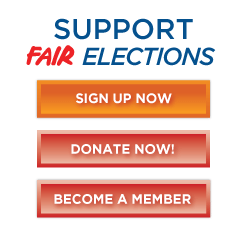Lawmakers, listen up: Voters want more disclosure
Last week, California legislators had a chance to take a small but crucial step toward improving transparency and accountability in California's increasingly dysfunctional political process. They failed, but this fight is far from over: Results from The Greenlining Institute's just-released voter survey show that voters demand action. AB 1148, authored by Assemblywoman Julia Brownley (D-Santa Monica), would have improved disclosure on political advertisements to more accurately reflect the top donors behind ballot measure and expenditure campaigns. It received a healthy 52-26 majority on the Assembly floor Jan. 31 - two votes shy of the two-thirds required for passage. Opponents made simply bizarre claims that the bill would somehow have stifled free speech. Actually, it would have closed a huge loophole in our campaign finance disclosure laws. Currently, a campaign committee can saturate the airwaves with misleading ads while hiding behind a warm and fuzzy name that sounds great but tells voters nothing, like Californians for Responsible Government, or Californians for Apple Pie and Cute Puppies. If Californians for Apple Pie and Cute Puppies is actually a front for oil and chemical companies or some other special interest, voters want to know. Last year, concerned about the degree to which ballot initiatives - theoretically a vehicle for citizen democracy - have become a tool for wealthy interests, The Greenlining Institute commissioned a two-wave public opinion survey of Californians. We also launched a statewide listening tour, convening 17 sessions in 14 California cities to talk with real people about their experiences and what they want to see reformed. Among other things, voters overwhelmingly told us they want more and better information, clearer disclosure and more transparency. Fully 85 percent said it was important to know who funds initiative campaigns. Strong majorities wanted this information in campaign ads, as AB 1148 would have required, and in the state voter guide. Perhaps most important for the legislators who didn't support AB 1148, 59 percent said they would be less likely to vote for a legislator who opposed increasing disclosure of campaign funders on political advertisements. Fifty-seven percent of registered Democrats and 52 percent of registered Republicans said this. Make no mistake: AB 1148 will be back in some form, and we look forward to working with other supporters like the California Clean Money Campaign to get it passed - and, if necessary, to make sure voters know who is standing in the way. But disclosure of funders isn't the only thing bothering voters. Seventy-three percent felt that the rights of various groups of people had often been attacked via ballot initiatives, with 41 percent feeling that their own rights had been under attack on the ballot. Voters also told us they want "a fuller picture" of the potential impact of a ballot measure. The voter guide already provides a fiscal impact analysis, but strong majorities told us they'd also like to know about the social impacts - for example, the estimated impact of a proposal on the state's unemployment and poverty rates, and on the environment. And - not surprising, given the number of initiatives that have ended up mired in legal challenges and conflicts over their meaning - 81 percent said they wanted an improved system of review to flag legal issues or drafting errors. Who do they trust to do this? Not the legislature. A plurality (46 percent) preferred a citizen's commission. The question of who has access to the initiative process is another major concern. Presently, the costs and mechanics of signature-gathering stack the deck in favor of those with millions of dollars to throw around. We also need to think about access in other ways. For example, there are millions of California voters whose first language isn't English and whose English proficiency is limited. Right now, these voters have no say about what gets on the ballot because petitions aren't translated.
There is much to do, ad when we decided to delve into this
issue we knew it wouldn't be easy. But Californians value
our ballot initiative system for what it was intended to
be: grassroots citizen democracy. Now we as leaders need
to get serious about bringing it back to that ideal and
listen to what the people have to say. See the article on Capitol Weekly website (In accordance with Title 17 U.S.C. Section 107, this material is distributed without profit to those who have expressed a prior interest in receiving the included information for research and educational purposes.) |



